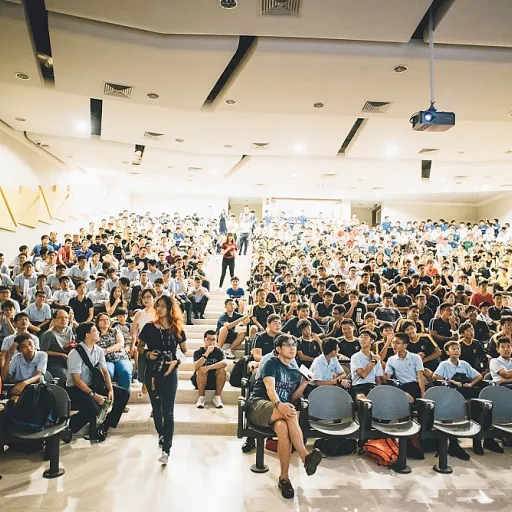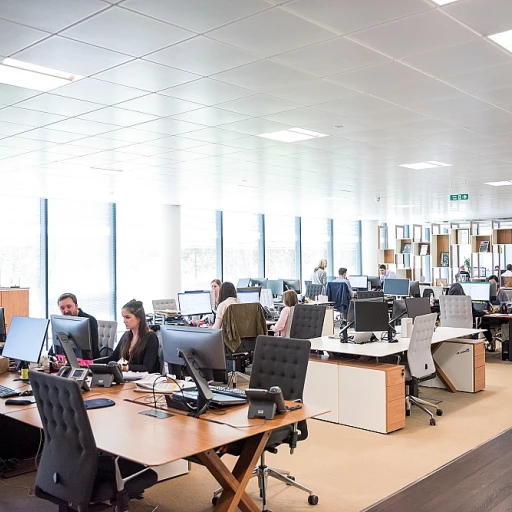
Understanding the Concept of an Intelligent Workplace
Defining the Intelligent Workspace
In today's rapidly evolving business landscape, the concept of an intelligent workspace is gaining traction. But what exactly does it mean? At its core, an intelligent workplace leverages advanced technology and data-driven insights to create a more efficient, flexible, and productive work environment. This involves integrating digital tools, cloud computing, and machine learning to enhance the employee experience and streamline operations.
Technology and Tools in Intelligent Workplaces
Intelligent workplaces utilize a variety of digital tools and systems to support hybrid work models. These include room booking software, visitor management systems, and desk booking solutions. By implementing these technologies, companies can optimize their office space and improve collaboration among employees, whether they are working remotely or on-site.
Data-Driven Decision Making
Data analytics plays a crucial role in intelligent workplaces. By analyzing real-time data, management can make informed decisions that enhance productivity and employee satisfaction. This approach allows for more effective knowledge management and helps identify areas for improvement within the organization.
Enhancing Employee Experience
An intelligent workplace is not just about technology; it's also about creating a supportive and engaging work environment. By focusing on employee needs and preferences, companies can foster a culture of innovation and collaboration. This, in turn, leads to higher job satisfaction and better performance.
For more insights into the legal aspects of workplace dynamics, you might find it useful to explore understanding New York's at-will employment status.
Key Characteristics of an Intelligent Workplace
Unraveling the Characteristics of Intelligent Workplaces
An intelligent workplace is more than just a modern office with cutting-edge technology. It embodies an ecosystem where digital tools, data, and human interactions converge to create a seamless and productive environment for employees. To better understand these environments, let's delve into some key characteristics making workplaces intelligent.- Integration of Digital Tools: Intelligent workplaces leverage digital tools that simplify day-to-day tasks, like room booking and desk booking software. These systems are designed for ease of use while optimizing office space utilization, fostering flexibility in hybrid work models.
- Data-Driven Decision Making: Data analytics plays a crucial role in smart workplaces. It enables management teams to make informed decisions that enhance productivity and improve the employee experience. By utilizing data, managers can identify trends and efficiencies, guiding strategic initiatives.
- Technology and Real-Time Capability: Cloud computing and machine learning have become the backbone of intelligent workplaces. These technologies empower systems to function in real time, automating repetitive tasks and allowing employees to focus on more valuable work.
- Enhanced Collaboration and Communication: Digital collaboration tools are the lifeblood of hybrid workplaces, enabling seamless communication regardless of location. These tools facilitate teamwork, bridging gaps between remote and in-office employees.
- Adaptable Workspaces: A truly intelligent workplace requires adaptable workspaces that cater to the varied needs of its workforce. This includes the flexibility in workplace design and customizable office setups to accommodate different work styles and tasks.
The Role of HR in Fostering an Intelligent Workplace
Elevating HR's Influence in Crafting Intelligent Workplaces
The development and maintenance of intelligent workplaces heavily rely on the strategic role of HR, as this department steers the adoption and effective utilization of digital tools and systems within an organization. In nurturing intelligent workspaces, HR professionals bridge the gap between employees and advanced workplace solutions, ensuring that the integration of technology enhances productivity and elevates the overall employee experience. Here's how HR can facilitate an intelligent workplace:- Fostering Digital Transformation: HR is crucial in championing the digital transformation journey, carefully selecting and implementing smart technologies such as cloud computing, data analytics, and machine learning to streamline office operations and facilitate real-time collaboration.
- Implementing and Managing Systems: By deploying efficient room booking and visitor management systems, HR ensures seamless hybrid work experiences. Such systems not only improve space utilization but also empower employees to manage their tasks effectively.
- Enhancing Knowledge Management: HR's commitment to promoting a culture of learning is vital for employees to adapt to new digital landscapes. Implementing knowledge management tools allows teams to efficiently share expertise and drive innovative solutions across the company.
- Improving Employee Communication: Creating open channels using digital tools enables HR to cultivate strong communication lines within the organization. This begets better collaboration and more robust workforce relations in hybrid workplaces.
Impact of an Intelligent Workplace on Employee Performance
Optimizing Employee Performance Through Intelligent Workspaces
A truly intelligent workplace has a profound impact on employee performance. Utilizing tools and techniques like digital tools, data analytics, and cloud computing, these workplaces create an environment that nurtures both productivity and satisfaction. One significant aspect of intelligent workplaces is their reliance on technology to transform traditional work methods. By integrating smart office systems, management can facilitate better collaboration among employees, irrespective of their physical location. This is especially crucial in hybrid work environments where flexibility and communication are key. Furthermore, leveraging real-time data allows workplaces to adapt quickly to the needs of their employees. Spaces can be adjusted using room booking or desk booking software, ensuring that teams have the necessary resources for productivity. This adaptability leads to enhanced employee experience, allowing them to focus on meaningful tasks without unnecessary distractions. Additionally, workplaces that emphasize data-driven decision-making and cloud-based collaboration tools often see improved employee engagement. These intelligent solutions underscore the importance of efficient workplace management, reducing time lost on administrative tasks and inefficiencies. Ultimately, the capacity of a workplace to be responsive and adaptable directly correlates with improved employee performance. A smart workplace, armed with digital tools and coherent systems, not only supports current work demands but also prepares employees for future challenges, positioning the organization for ongoing success.Challenges in Transitioning to an Intelligent Workplace
Overcoming Obstacles in Creating a Dynamic Work Environment
Transitioning to an intelligent workplace can be thrilling yet challenging for many organizations. As companies seek to harness the power of digital tools and data analytics to enhance productivity, they often encounter several roadblocks.
Adapting to Hybrid Work Models
One of the primary challenges is adjusting to hybrid work models. The mix of remote and in-office practices requires flexible workplace solutions, like cloud computing and room booking systems. Employers must ensure efficient collaboration across diverse locations, making the role of technology in seamless communication crucial.
Integration of Smart Systems and Data Management
Incorporating workplace intelligent systems also includes managing large volumes of data. This integration demands precise planning and implementation to avoid disruptions in the workflow. The key is to design systems that support the intelligent processing of data, ensuring invaluable insights inform employee experience and management decisions.
Employee Adoption of Digital Tools
The success of transitioning relies heavily on how employees embrace new digital tools. Facilitating familiarization and comfort with new technologies, such as machine learning systems and desk booking software, is imperative. Employee training programs tailored to these technologies help ease the transition, boosting engagement and confidence.
Maintaining Real-Time Communication
As workplaces evolve, maintaining real-time communication becomes more vital. Leveraging digital workplace solutions makes it possible to keep employees connected, reducing the complexity of hybrid workplace structures. Factors like digital room booking and visitor management systems contribute to the seamless operation of such environments.
Redefining Leadership and Change Management
Finally, effective change management and leadership redefinition are crucial in this transformation. Leaders should adapt to drive the shift towards intelligent workspaces through strategic planning and fostering a culture that supports continuous learning and adaptability.













